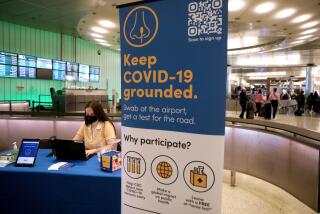Consumer Report : Stay Healthy on Planes
- Share via
While waiting for your plane to take off, suppose you notice that red blotches stand out on the face of the person sitting next to you or some other visible sign of a condition that you think might be contagious? Or the passenger looks ill or disoriented?
What can you or the flight attendants do?
Recently, a passenger sitting next to a child on a flight about to leave Frankfurt, West Germany, for the United States complained to a flight attendant that the boy had rashes on his arms.
The attendant asked the boy’s parents, who said the rashes came from mosquito bites. Subsequently, the attendant determined that the parents didn’t have a doctor’s note indicating the child could fly with his “condition.”
Pilot Makes Decision
Rather than risk the plane and all of its passengers being possibly quarantined in New York City, the attendant consulted with the captain and gate agent, and the decision was made to ask the parents and child to get off the plane and obtain a doctor’s note. After seeing a doctor at the Frankfurt airport, the family was able to catch a later flight.
“Each situation involving the condition of a passenger can be different,” an airline spokeswoman said. “The captain and gate agent are informed. The passenger is questioned, with a determination then made on whether the passenger is fit to fly and whether there is any danger to other passengers and flight personnel. In most situations, no action is required.”
If a medical question about a passenger arises after takeoff, the captain can radio ahead to the next airport if the matter is considered serious enough. Health authorities would then take a look at the passenger in question (and possibly other passengers as well) before the plane is cleared.
“Cabin personnel have to apply a test of reasonableness in such situations,” said a spokesman for the Air Traffic Assn., a trade association for airlines. “The flight report is an internal document and covers anything that happened during the flight, even a coffee maker that doesn’t work.”
The general policy is that before the door to the plane closes, “it’s the gate agent’s judgment,” the spokesman said. After the door closes, it’s the captain’s responsibility.
Advice From Doctor
Though time is an obvious factor, the gate agent and captain can seek medical advice from the airline’s medical staff or advisers, either by phone or in person. Similarly, flight personnel may find a doctor on board who could give an opinion.
If you are the person in question, getting a doctor’s note is your responsibility. Whether you receive any amenities, such as meals and hotel accommodations, is up to the airline.
In the future, airline personnel may have to exercise even more caution in how to handle such situations, especially where deplaning and refusing service are involved, according to Matt Finucane, safety director of the Assn. of Flight Attendants.
“Passengers who are suspected of a serious communicable disease may have certain protection under new rules regarding handicapped passengers being proposed by the Department of Transportation,” Finucane said.
“Such passengers would be considered to be handicapped and protected against discrimination by carriers. If an airline deplaned a passenger who didn’t have a communicable disease that could be transmitted during the flight, they might have a legal case on their hands.”
Bring Note Along
If you have a condition that could arouse some attention, it might be prudent to carry a doctor’s note. You can be refused service at check-in, and airline personnel have the discretion to ask for a doctor’s note if your appearance creates doubt.
Once you board the flight, it can be similarly useful to alert flight attendants immediately of any special circumstances or conditions.
Several years ago I flew from New York City to Bombay, India, with a non-contagious but highly visible shaving/skin irritation that required frequent applications of an ointment prescribed by my dermatologist.
The medication was both greasy and quite noticeable, so I casually explained the situation to the passenger sitting next to me, who initially didn’t look overjoyed at my presence. There were other seats available, but he chose to stay put.
If I were taking that flight today I would make sure I had a doctor’s note explaining my condition/medication, to avoid any problems at check-in or during the flight.
If a situation arises during flight, you can ask for another seat. But such relocation depends, obviously, on the availability of other seats and the degree of inconvenience or danger.
More to Read
Inside the business of entertainment
The Wide Shot brings you news, analysis and insights on everything from streaming wars to production — and what it all means for the future.
You may occasionally receive promotional content from the Los Angeles Times.








